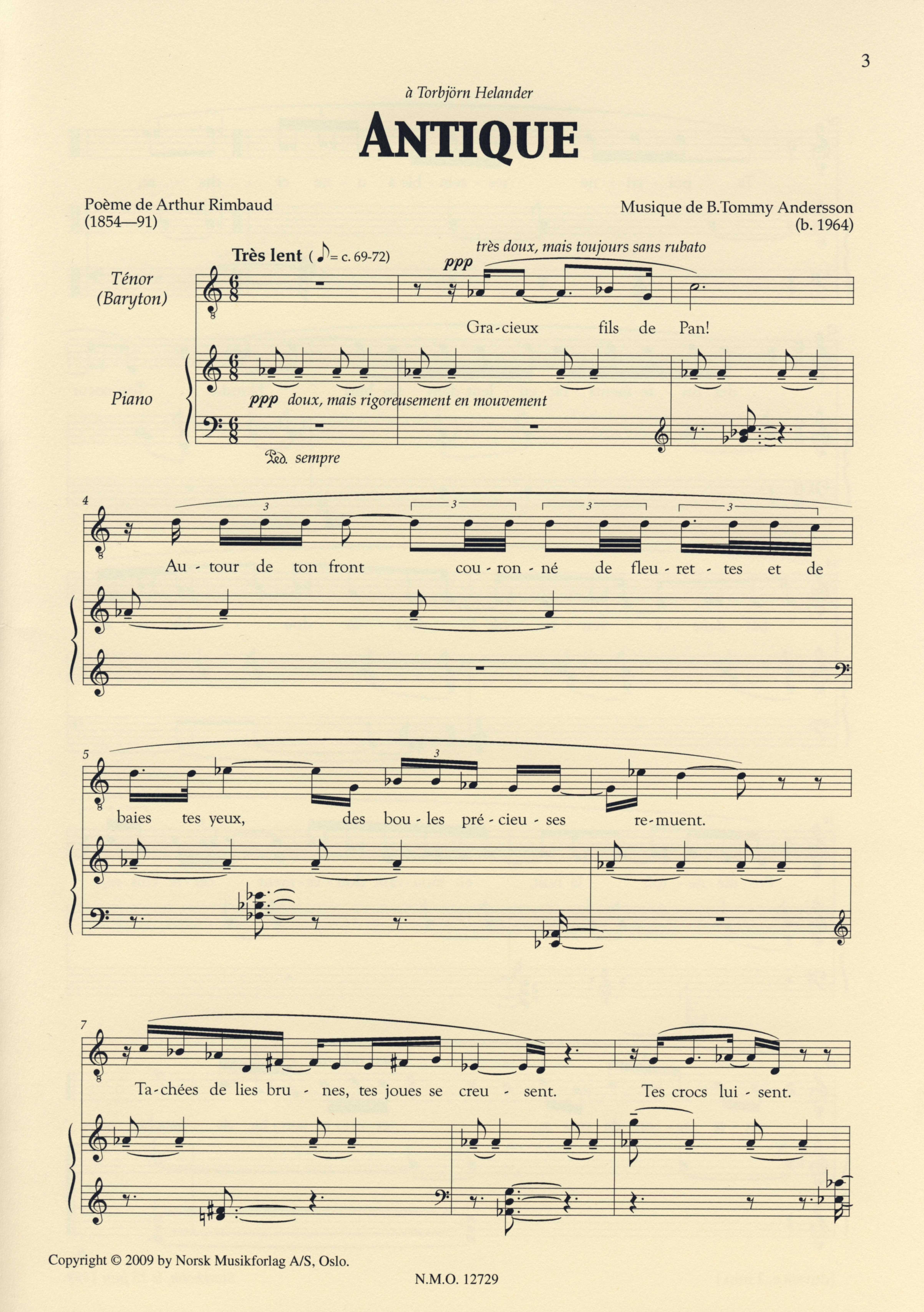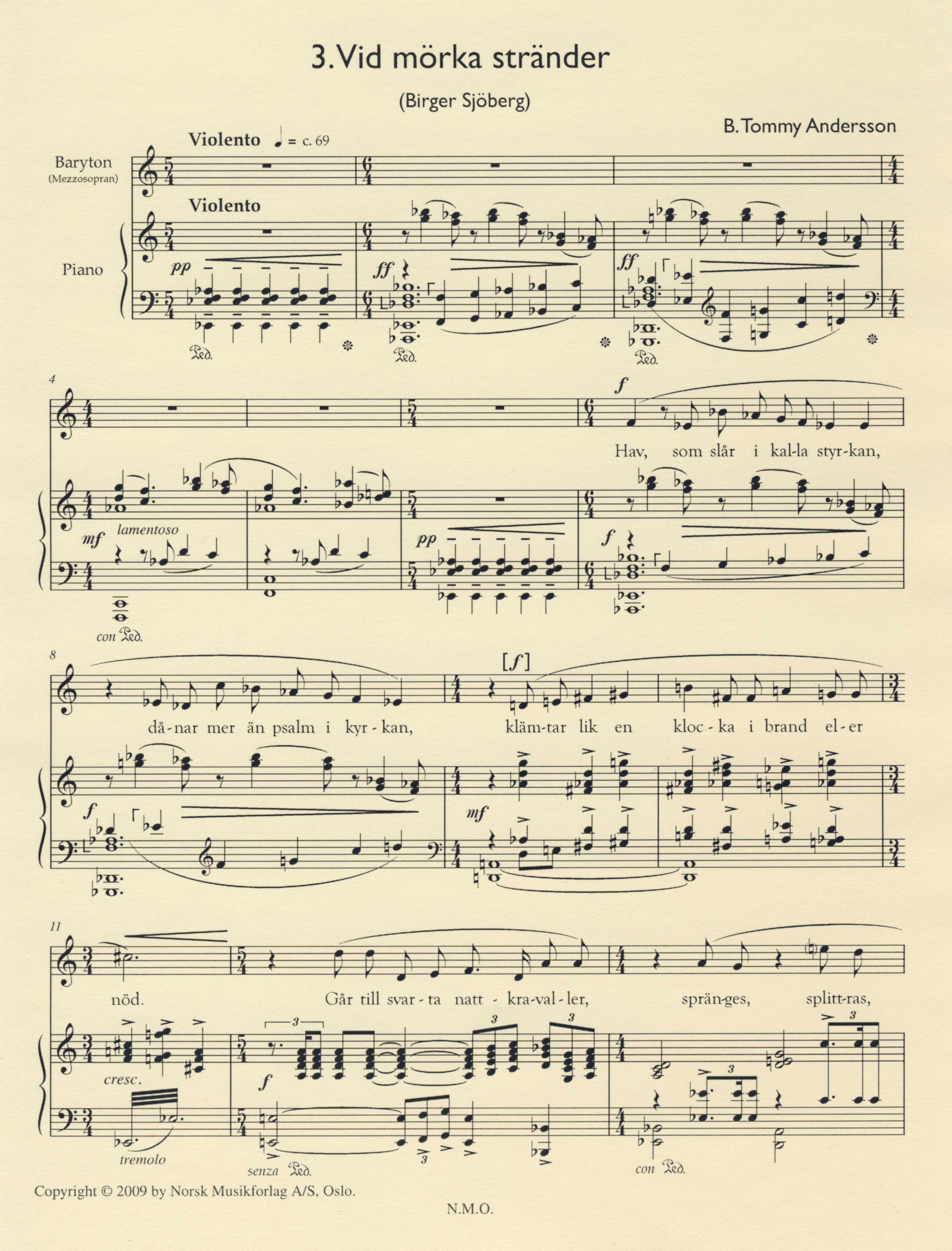— Solo Voice(s) with Instrument(s)
* indicates a withdrawn piece
** indicates juvenilia, withdrawn and not available
Sonetti di Michelangelo, for voice and piano
Date of composition: Stockholm, 24 January 2016
Text: Michelangelo Buonarroti (1475–1564), in Italian
1. Se ‘l foco fusse alla bellezza equale (Rime no. 77)
2. Tu sa’ ch’i’so, signor mie, che tu sai (Rime no. 60)
3. I’ mi credetti, il primo giorno ch’io (Rime no. 80)
4. Veggio co’ be’ vostr’occhi un dolce lume (Rime no. 89)
5. Veggio nel tuo bel viso, signor mio (Rime no. 83)
Duration: 12 min. (1,5+3,5+1,5+3,5+1,5 min.)
Dedication: To my dearest friend Magnus Svensson.
Publisher: Norsk Musikforlag A/S, Oslo, 2018
N.M.O. 14405 / ISMN 979-0-065-16134-1
First performance: 10 October 2016, Dixon Recital Hall, Tulane University, New Orleans, USA. Jeremy Huw Williams (baritone), Paula Fan (piano).
About the piece: Everyone knows that Michelangelo Buonarroti (1475–1564) was one of the most famous sculptors and painters during the Italian renaissance. It is not as familiar that he also wrote poems.
…..These songs are based on five of his Rime from the 1530’s. The chosen poems are all written in the formal rhyme scheme of a sonnet, and they are all inspired by a young nobleman, Tommaso dei Cavalieri, whom Michelangelo met in 1532, when Cavalieri was 23 years old. This young man was exceptionally handsome in a way that met Michelangelo’s ideal for male beauty and it led to a very close, lifelong friendship. Cavalieri was present when the artist died. Around 30 of Michelangelo’s 302 poems are dedicated to him.
…..The language is an old and elevated Italian, filled with references to Petrarca’s sonnets, but it still makes sense to modern Italians. These songs should be sung in the original language, not in a translation into any other language, but for the benefit of making it easier to understand the content of the poems, I submit English interpretations by John Addington Symonds, published in 1878. They do not always follow the original poems very closely, but they still give some indication of the meaning of the words.
…..For a poetic version in Swedish, I would like to refer to Kärleksdikter, a translation by Sverker Åström, published by Lind & Co in 2005. These interpretations are quite close to the intentions of the original text. All five poems in this song cycle can be found in this book.
Antique, for male voice and piano
 Date of composition: Stockholm, 25 June 1999
Date of composition: Stockholm, 25 June 1999
Text: Arthur Rimbaud (1854–91), in French
Duration: 2 min.
Dedication: To Torbjörn Helander
Publisher: Edition Norsk Musikforlag A/S, Oslo, 2009
N.M.O.12729 / ISMN 979-0-065-11916-8
First performance: 17 April 2009, Grünewaldsalen, Stockholm Concert Hall. Andreas Landin (bar.), Magnus Svensson (pno.)
Lyssna på ljudklipp (mp3)
* Hesse-Lieder, for baritone and piano
Date of composition: Sjömarken, March 1982
Text: Hermann Hesse (1877–1962), in German
1. Ravenna
2. Allein
3. Spätblau
4. Liebeslied
Duration: 12 min.
Dedication: To Pauli Grekula
Hymnus, for soprano, baritone, and piano four hands
Date of composition: Sjömarken, 4 November 1982
Text: Sanctus & Benedictus from the Catholic Mass (Latin)
Duration: 8 min.
Publisher: Swedish Music Information Centre, Stockholm
* Syllogismer [Syllogisms], for soprano and piano
Date of composition: Sjömarken, 31 December 1981
Text: Gustaf Fröding (1860–1911), in Swedish
1. De gode och de ädle
2. Idealism och realism
3. Tro och vetande
Duration: 7 min.
Dedication: To Margareta Skyllberger
First performance: 2 April 1982, Borås Art Museum. Margareta Skyllberger (sopr.), Jan-Anders Eriksson (pno.)
About the piece: Margareta Skyllberger was B. Tommy Andersson’s song teacher at Borås Music School, 1981—83. She commissioned the composer to write these songs.
Fyra Bilder [Four Pictures], for voice and piano
Date of composition: Sjömarken, 19 September 1981, revised July 2008
1. Min fordran är ej ringa (text: Birger Sjöberg, 1885–1929)
2. Långt borta i världen (text: Erik Axel Karlfeldt, 1864–1931)
3. Vid mörka stränder (text: Birger Sjöberg)
4. Förklingande ton (En kafémelodi berättade…) (text: Birger Sjöberg)
 (All songs in Swedish)
(All songs in Swedish)
Voice: baritone or mezzo
Duration: 18 min.
Dedication: To Dan Lind
Publisher: Edition Norsk Musikforlag A/S, Oslo, 2009
N.M.O.12730 / ISMN 979-0-065-11917-5
First performance: 2 April 1982, Borås Art Museum. Dan Lind (bar.), Jan-Anders Eriksson (pno.)
Lyssna på ljudklipp (mp3)
|
|
|
|
||
|
** Vier Deutsche Lieder [Four German Songs], for voice and string orchestra
Date of composition: Sjömarken, 2 August 1980
1. Um Mitternacht (Eduard Mörike, 1804–75)
2. Die Stadt (Theodor Storm, 1817–88)
3. Frühling (Hermann Hesse, 1877–1962)
4. Karfreitag (Hermann Hesse)
(All songs in German)
Voice: mezzo or baritone
Duration: 20 min.
First performance: 29 March 1981, Die Pumpe, Kiel (Germany). Mareile Koltoniak (mezzo), Kieler Jugendorchester, Jan Lensky (cond.)
